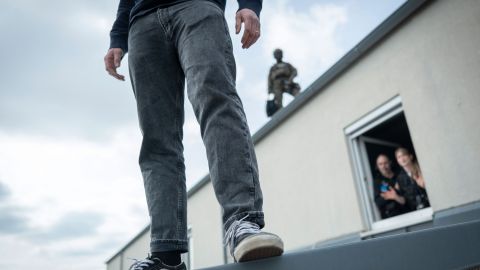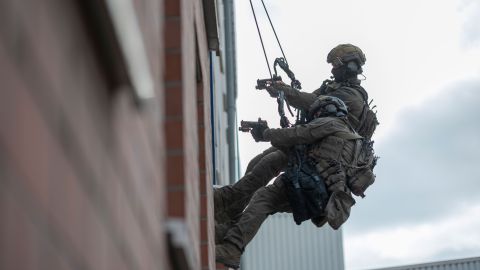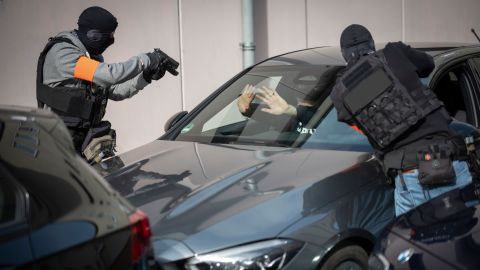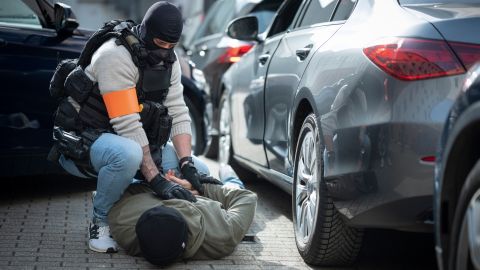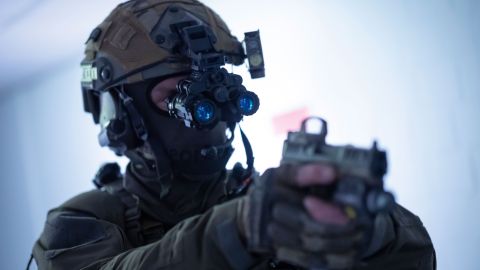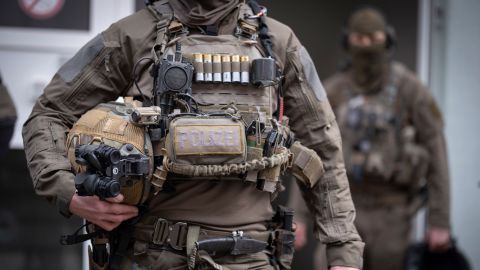Fifty years ago, the Conference of Federal and State Interior Ministers decided to establish the SE. Since then, police weaponry, training, equipment, operational concepts and tactical training have improved enormously. Nevertheless, the operational situations are dangerous and challenging. Because not everything can be foreseen.
Being fit, training body and mind, every day - that is the task. Because a situation can arise at any minute in which the SEs are called upon. How do you do that? Staying alert in constant readiness! The special units in Düsseldorf train in a former industrial complex on the outskirts of the state capital. Peter (for security reasons, the active members of the special units have been given fake aliases in this text) has prepared a few typical deployment scenarios. The 51-year-old is responsible for training at the Düsseldorf SE.
It starts with a suicide situation. A policewoman and a police officer are standing at a window and want to calm a man down so that he doesn't throw himself off the roof. A marksman from the special task force (SEK) is keeping an eye on the colleague from the negotiation group (VG) so that he can intervene immediately. After all, people in exceptional psychological situations are difficult to predict.
Another setting shows the means used by the mobile task force (MEK). A planned arms deal is being observed. An MEK officer remains inconspicuous near the parked suspicious vehicle. Suddenly, a van appears, from which armed MEK officers jump out and arrest the surprised gangsters. Another scene simulates how a Mercedes with drug dealers is suddenly wedged in by three vehicles at a traffic light stop. It happens so quickly that the gangsters can no longer react.
The SEK demonstrates how climbing teams break into houses. If necessary, upside down like a bat. The SEK is broadly based and has trained paramedics. They can quickly treat gunshot wounds if the need arises.
A sequence reminiscent of the explosion in Ratingen a year ago is particularly threatening. Thick yellow clouds cover a hallway in which a man is silhouetted waving a knife around. Two SEK officers aim laser beams at the attacker. Colleagues approach from the other side, heavily armed and equipped with breathing apparatus and oxygen cylinders.
The simulated scenarios are followed by explanations: Uli, commanding officer at the SEK in Essen, was fascinated by the capabilities of the SE as a young police officer in a riot police unit. He was particularly impressed by the fitness of the self-confident SEK officers. He applied for the special task force and was successful. 50 percent of applicants fail the introductory training. "
I quickly realized that it's not just about physical fitness," says the 47-year-old looking back. "However, being athletic is a basic requirement for the job." Even the bullet-resistant vest with stab protection weighs about as much as a small child today, plus the weapons and the heavy helmet. Good back and neck muscles are essential. In total, you often carry more than 30 kilos with you.
"We have a huge responsibility. No one comes after us. We have to end the situation." Mistakes could be life-threatening. "That's why we need well-rehearsed procedures so that we know what to do in extreme situations," says the Münster native, who has long since made his home in the Ruhr region.
Skillful tactical behavior and cooperation with the other sub-units are crucial. "Every SEK unit is made up of individuals with different specializations," explains the First Chief Superintendent. There are many specializations in the SEK for the different operational situations.
Of course, the experience from many operations helps. "During the follow-up, we analyze what could go even better next time. Most of us get stronger with time," says Uli. "At least as long as the body keeps up."
The family is an important source of support. Of course, his wife and two children sometimes worry. "But they trust that we'll manage." The SEKs are still a male domain. This is mainly due to the physical demands. But they are changing in order to remain modern and efficient.
Even in the SEK, it's not neck and neck every day. During various operations, the police leadership only calls in the team as a preventative advisor, for example at major political or sporting events. "But we are always prepared for the fact that something could happen."
The special units of the NRW police consist of four sub-units. The SEK cooperates particularly closely with the MEK, for which Phil has recently started working. In March, he was presented with the Schwinge, the badge of the special units, in a festive ceremony in Selm. "I was already interested in surveillance at the CID," he says. "I can now deepen that with the Düsseldorf MEK. I'm attracted by the tactical possibilities that this opens up.
"At 35, he was one of the oldest in the training course," says the chief inspector. "Giving your all is important," he says. You can't blow your cover under any circumstances. "The criminals usually only notice us when their hands are handcuffed behind their backs." You also have to be able to drive very well so that you can chase after the criminals at high speed without being noticed if necessary.
The special units rely on audio, video, tracking, opening techniques, sensors, computers and electrical systems to work during SE operations. This is ensured by the Technical Operations Group (TEG). Mark is a trained information technology assistant. He has been with the TEG in Dortmund since 2015. "My previous job, in which I was involved in the operation of computer systems, was a good foundation," says the 39-year-old police chief inspector.
Combining advanced technology with covert operational missions is challenging. "We always have to be better than the perpetrators with our equipment," demands the TEG operations manager. Everything is now network-based. "Our colleagues are used to being constantly supplied with information. But technology sometimes goes on strike. Then we have to work flat out to find the fault very quickly."
Police Chief Inspector Lisa and her negotiation group (VG) at Münster police headquarters are also looking for solutions. The VG, the fourth sub-unit, specializes in talking to offenders and providing police support for people in exceptional psychological situations. "We most often deal with suicidal people who we want to stabilize," says the 58-year-old deputy head of the negotiation group. "But of course we are also deployed in hostage situations, rampages or kidnappings."
Communication techniques and negotiation tactics have to be trained regularly. You can't just talk at random. "We are bound by the order situation and our conversations support the goals set by the police leadership." Contact is usually made via telephone or social networks. However, the aim is to have a direct line: "When we see them, we can assess them better." It is very satisfying to defuse the situation with words. Unfortunately, this doesn't always work. "In principle, however, negotiations are an opportunity and the mildest means," summarizes Lisa.
The digital transformation is now presenting the special units with enormous challenges. The types of crime are changing. Processes and structures that have been tried and tested by the police for decades are reaching their limits. The focus of operations has already shifted. Traditional bank robberies and spectacular hostage-takings have become much rarer.
Gangsters are turning to the latest technological know-how and using cyberspace to commit their crimes. "Artificial intelligence plays a central role for us," says North Rhine-Westphalian police inspector Michael Schemke (see also the interview on pages 16 and 17). Professional criminals are covering their tracks online. However, the police reacted quickly to the upgrading of the other side.
KI will be used everywhere, emphasizes Schemke. Increasing amounts of data must be processed in compliance with data protection. "We want and need to be better and more experienced than our counterparts," he states.
This also applies to the use of special units in particular. Their technical capabilities have developed enormously. Sensors and robots have long been used for surveillance. "The better we prepare ourselves technically for deployment, the greater our chances of success," believes the 63-year-old Krefeld native.
In addition, global mobility and connectivity have led to globalized gang crime. "Cooperation across borders is increasingly becoming part of everyday life," says the police inspector.
To gauge the journey that the North Rhine-Westphalian special units have made, it is worth meeting former SE officers Walter Schmitz, Werner Ludwig and Thomas Dammers. Schmitz helped set up the SEK Cologne half a century ago. Until 1987, he was initially group commander and later commanding officer in Cologne. He then moved to the North Rhine-Westphalian SE coordination office in Düsseldorf. When the legendary hostage-taking in Gladbeck took place in 1988, he was on the staff tasked with managing the situation. "There was internal friction, missed opportunities and overwhelmed police leaders," says the now 77-year-old, summing up the situation.
A lot of trial and error and improvisation took place during the set-up phase. "It's nothing like today." He looks at a few photos from the past on his notebook. "From the perspective of 2024, the old equipment looks a bit like a kindergarten," says Walter Schmitz. Of course, great things were often achieved under completely different conditions. "Standardization and controlling were still very underdeveloped." In addition, the cumbersome decision-making processes of the time were determined by the command principle and unclear responsibilities.
The inadequacies were also experienced first-hand by Werner Ludwig, who was still a very new MEK officer at the time, during the Gladbeck hostage crisis. He had started in the Düsseldorf MEK in 1987. "We were nowhere near as well-trained as our colleagues are now," admits the 65-year-old, who retired in 2022. "The MEK and SEK only had a few points of contact at the beginning. We came from the CID and the others from the Schupo."
On the third day of the cat-and-mouse game that had started in Gladbeck, the Düsseldorf MEK was tasked with keeping an eye on the car of hostage-takers Hans-Jürgen Rösner and Dieter Degowski. "Suddenly I was in stop-and-go traffic near Wuppertal-Elberfeld station, directly behind the target vehicle," reports Ludwig. "I put the gun on my lap and turned down the radio. I felt queasy."
He was under high tension for two minutes. Then it was over. Others took over. A little later, there was a showdown on the A3 towards Frankfurt before the Bad Honnef/Linz junction. In the exchange of fire between the serious criminals and the police, 62 shots were fired. The 18-year-old hostage Silke Bischoff was killed by a bullet from Rösner's gun. "Thank God we haven't lost another hostage since Gladbeck," Walter Schmitz states. The directive issued afterwards to keep the situation stationary has proved very effective.
Thomas Dammers knows this from his own experience. In December 1999, a criminal with several previous convictions forced his way into the Aachen branch of the state central bank with three hostages and extorted 1.5 million marks. As head of the Special Forces command center in Cologne, Dammers went there immediately. "We decided not to let the perpetrator out in a getaway car under any circumstances." The risk was no longer calculable on the third day. "The incident command gave the go-ahead for the final rescue shot." The hostage-taker died and all the hostages survived.
